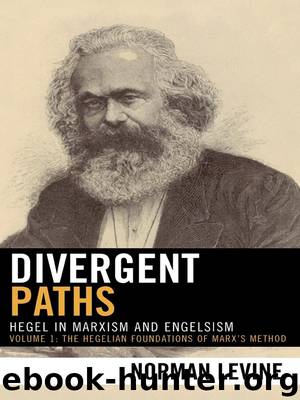Divergent Paths by Levine Norman

Author:Levine, Norman
Language: eng
Format: epub
ISBN: 9780739154304
Publisher: Lexington Books
Published: 2013-06-24T16:00:00+00:00
In the above paragraph the young Engels used the term “negation” to mean difference, or the contrast between one state and another. “Negation” meant one thing distinguishing itself from another.
This was not the Hegelian meaning of negation, because his definition of the term comprised three parts, cancellation, retention, subsumption. In the realm of ideas, the act of negation occurs when one concept canceled another, showed that it was no longer relevant, but retained a part of the idea that had been canceled. Negation did not mean extinction, but something of the thing that was negated survived and was absorbed in the new synthesis. Hegel’s idea of negation also contained a progressive dimension, the assumption that the new object subsumed the negated thing, that the new object superceded the negated thing.
Another serious flaw in the young Engels’s conceptualization of Hegel was his inability to draw distinctions between various philosophers or legal scholars: the young Engels did not group intellectuals in terms of their true definitions or philosophic characteristics. For example, when he described the new life injected into Hegelianism, he wrote this sentence: “Strauss in theology, Gans and Ruge in the political field were all epoch making.”(104) The young Engels was incapable of making delineations among these three men. Strauss did not belong to the Young Hegelian school, and his book The Life of Jesus, did not breathe new life into Hegelianism but rather caused the disruption of the Old Hegelians. Strauss used reason to criticize the New Testament, but this did not make him a Hegelian. Major differences separated Gans and Ruge.
Eduard Gans was a vital figure in the transition from Hegel to the Young Hegelians. A Jew, Gans was initially denied an appointment to the faculty of law at the University of Berlin by Friedrich Karl von Savigny on anti-Semitic grounds. After a long struggle, Gans triumphed over the opposition of Savigny, and began teaching law at the University of Berlin after his conversion to Christianity.
He became a personal friend of Hegel, and when Hegel died in 1831, Gans organized the “Society of Friends of the Eternal,” a group of colleagues who sought to perpetuate the works of Hegel, and under the direction of Gans issued in 1835 the first collected edition of all of Hegel’s works that were available at that time. Gans himself died in 1839.
Advocate of the French Revolution of 1830, Gans was a powerful force in the creation of a Liberal Hegelianism. He was a German Liberal and opposed the conservative politics and legal theory of Savigny, a leading member of the German Historical School of Law, and a defender of Prussian autocracy. Hegel and Gans both refuted the legal positivism of the Historical School of Law. Gans not only inspired Liberal Hegelianism, but helped pass this tradition on to the young Marx. During the young Marx’s studies in law at the University of Berlin, he took two courses from Gans and was influenced by Gans’s theory of law and property.
Although Gans was greatly influenced by the 1830 French Revolution, he was not a Young Hegelian in the style of Ruge.
Download
This site does not store any files on its server. We only index and link to content provided by other sites. Please contact the content providers to delete copyright contents if any and email us, we'll remove relevant links or contents immediately.
International Integration of the Brazilian Economy by Elias C. Grivoyannis(111059)
The Radium Girls by Kate Moore(12028)
Turbulence by E. J. Noyes(8049)
Nudge - Improving Decisions about Health, Wealth, and Happiness by Thaler Sunstein(7706)
The Black Swan by Nassim Nicholas Taleb(7129)
Rich Dad Poor Dad by Robert T. Kiyosaki(6632)
Pioneering Portfolio Management by David F. Swensen(6300)
Man-made Catastrophes and Risk Information Concealment by Dmitry Chernov & Didier Sornette(6019)
Zero to One by Peter Thiel(5801)
Secrecy World by Jake Bernstein(4753)
Millionaire: The Philanderer, Gambler, and Duelist Who Invented Modern Finance by Janet Gleeson(4478)
The Age of Surveillance Capitalism by Shoshana Zuboff(4292)
Skin in the Game by Nassim Nicholas Taleb(4248)
The Money Culture by Michael Lewis(4207)
Bullshit Jobs by David Graeber(4190)
Skin in the Game: Hidden Asymmetries in Daily Life by Nassim Nicholas Taleb(4006)
The Dhandho Investor by Mohnish Pabrai(3764)
The Wisdom of Finance by Mihir Desai(3746)
Blockchain Basics by Daniel Drescher(3582)
